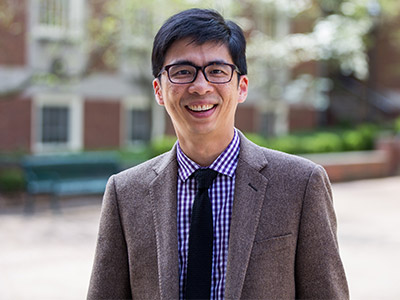Professor's Reading Group Explores How Church History Forms Our Story Today
Having just completed his second year of teaching at Pittsburgh Seminary, the Rev. Dr. Kenneth Woo, assistant professor of church history, has also been diving deeply into research, writing, and reflecting with students on the contemporary relevance of church history in a reading group that meets in his home twice each month. Discussion in that group is enriched by Ken’s current book project, which examines the nature and reception of John Calvin’s response to Nicodemism.
These times provide informal opportunities to engage historical texts in order to understand their meaning in their original contexts and also to discover what they might teach us for theology and ministry today.
“Nicodemism in the Reformation era,” Ken explains, “refers, for the most part, to the phenomenon of ‘Protestants playing Catholic’ to avoid persecution, but the term could also be applied more broadly to describe people who hid their religious commitments—like Nicodemus, who went to Jesus by night. Calvin had little patience for this sort of behavior, and my work examines how the Reformer’s context shaped his response to Nicodemism.” Since ideas always emerge from particular settings and concerns, Ken’s monograph will examine how, in the Reformation era, various groups deployed a theology of anti-Nicodemism to define and police boundaries around their communities by establishing its margins.
“Nevertheless,” Ken notes, “such definition of boundaries took place during a period of considerable fluidity of religious identity, so that the boundaries themselves were constantly shifting. At any given time, any number of the ‘other’ could be undetected in your midst. As you might imagine, this situation caused not a little anxiety for religious leaders.” Ken’s analysis reveals how a group’s ideals became expressed in descriptions of outsiders that cannot be understood apart from the particular context(s) in which they occur. “With an intrinsically invisible enemy,” Ken explains, “we learn far more from anti-Nicodemite writings about those bringing the accusations than we do about the accused, who in this case also conveniently tended not to talk back.”
It almost goes without saying that understanding these 16th-century dynamics gives insight into the ways in which we use theology to differentiate who is “in” from who is “out” in our contemporary context. Such questions have arisen in Ken’s historical theology reading group, in which a half dozen students from diverse denominational backgrounds and theological perspectives discuss works such as St. Augustine’s Homilies on 1 John, St. John Chrysostom’s On the Priesthood, and the writings of the Strasbourg reformer Katharina Zell. “These times provide informal opportunities to engage historical texts in order to understand their meaning in their original contexts and also to discover what they might teach us for theology and ministry today,” Ken observes. “The reading group gives us a space to think together about how we belong to a living tradition embodied in a catholicity that crosses geography and culture, as well as stretches back through time. We engage the writing of past Christians not only as a matter of intellectual curiosity but also as members of their larger community that values their voices, even if we do not uncritically accept everything they’ve said. We’re inspired by the good, but we can’t ignore the bad.”
In this vital way, Ken is extending his research and classroom teaching to help bridge contexts for students preparing at PTS to negotiate shifting contextual horizons in their various vocations. He’s inviting students to discover ways in which church history forms an important part of our story today.

